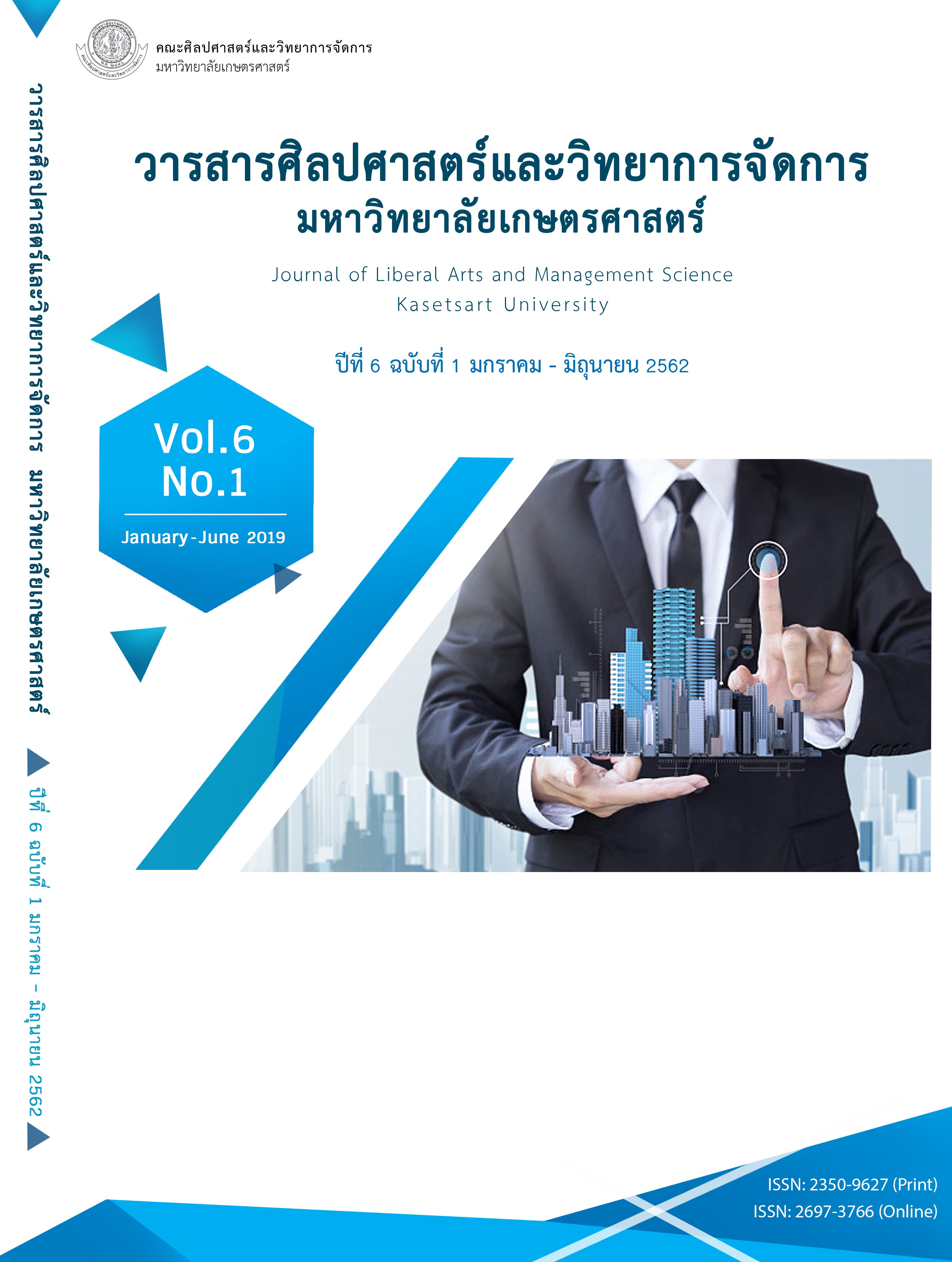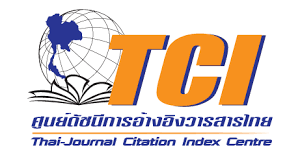ความสัมพันธ์ระหว่างคณะกรรมการสรรหา คณะกรรมการพิจารณาค่าตอบแทนและโครงสร้างความเป็นเจ้าของธุรกิจแบบครอบครัวกับผลการดำเนินงานของกิจการ
คำสำคัญ:
ผลการดำเนินงาน, คณะกรรมการสรรหา, คณะกรรมการพิจารณาค่าตอบแทนบทคัดย่อ
การวิจัยในครั้งนี้ มีวัตถุประสงค์เพื่อศึกษาความสัมพันธ์ระหว่างคณะกรรมการสรรหา คณะกรรมการพิจารณาค่าตอบแทน และโครงสร้างความเป็นเจ้าของธุรกิจแบบครอบครัวกับผลการดำเนินงานของกิจการ ของบริษัทจดทะเบียนในตลาดหลักทรัพย์แห่งประเทศไทย ในปีพ.ศ. 2556 – 2560 จำนวน 825 บริษัท ยกเว้น บริษัทที่อยู่ระหว่างฟื้นฟูการดำเนินงาน กลุ่มธุรกิจการเงินกองทุนรวมอสังหาริมทรัพย์ และกลุ่มธุรกิจประกันภัยและประกันชีวิต โดยเก็บข้อมูลทุติยภูมิจากระบบฐานข้อมูลตลาดหลักทรัพย์ออนไลน์ (SET SMART) การวิเคราะห์ข้อมูลใช้โปรแกรมสำเร็จรูปทางเศรษฐมิติในการทดสอบสมมติฐาน ผลการศึกษาพบคณะกรรมการทั้งสามรูปแบบนี้ไม่มีความสัมพันธ์ทางสถิติกับผลการดำเนินงานของกิจการที่วัดโดยอัตราผลตอบแทนของสินทรัพย์ (ROA) และผลการดำเนินงานที่วัดโดยมูลค่าทางการตลาด (Tobin’s Q) ผลการศึกษาชี้ให้เห็นถึงความเป็นไปได้สูง ที่คณะกรรมการกลุ่มนี้อาจขาดผู้เชี่ยวชาญหรือถูกลดบทบาทในการนำเสนอข้อมูลที่สำคัญต่อการบริหาร ดังนั้นจึงไม่ส่งผลกระทบต่อผลการดำเนินงานของบริษัท
เอกสารอ้างอิง
ตลาดหลักทรัพย์แห่งประเทศไทย. (2555). หลักการกำกับดูแลกิจการที่สำหรับบริษัทจดทะเบียนปี 2555. ศูนย์พัฒนาการ
กำกับดูแลกิจการบริษัทจดทะเบียน.
พรอนงค์ บุษราตระกูล และสุนทรี เหล่าพัดจัน. (2560). การศึกษาความสัมพันธ์ระหว่างค่าตอบแทนกรรมการ ระดับของการ
กำกับดูแลกิจการที่ดีและผลการดำเนินงานของบริษัทจดทะเบียนของประเทศไทย.
วิภาดา ภาโนมัย. (2559). โครงสร้างคณะกรรมการบริหารกับผลการดาเนินงานของบริษัทจดทะเบียนกลุ่มธุรกิจอาหารและ
เครื่องดื่ม. WMS Journal of Management, 5(2), 44-55.
Anderson, R. C., & Reeb, D. M. (2003). Founding-Family Ownership and Firm Performance: Evidence from
the S&P 500. The Journal of Finance, 58(3), 1301-1328.
Barontini, R., & Caprio, L. (2006). The Effect of Family Control on Firm Value and Performance: Evidence
from Continental Europe. European Financial Management, 12(5), 689-723.
Bhabra, G. S. (2007). Managerial ownership and firm-value in New Zealand. Journal of Multinational
Financial Management, 17, 142–154.
Black, BS, Jang, H, & Kim, U. (2002). Does corporate governance matter?: Evidence from the Korean
market.
Cybinski, Patti, & Windsor, Carolyn. (2013). Remuneration Committee Independence and CEO
Remuneration for Firm Financial Performance (Vol. 26).
Fama, Eugene F, & Jensen, Michael C. (1983). Separation of Ownership and Control. Journal of Law and
Economics, 26.
Fauzi, Fitriya, & Locke, Stuart. (2012). Board structure, ownership structure and firm performance: A study
of New Zealand listed-firms. Asian Academy of Management Journal of Accounting and Finance, 8(2), 43-
Hermalin, B. E, & Weisbach, Michael. (2003). Boards of directors as an endogenously determined
institution: a survey of the economic literature. Economic Policy Review, 5, 7-26.
Jensen, Michael C., & Meckling, William H. (1976). Theory of the firm: Managerial behavior, agency
costs and ownership structure. Journal of Financial Economics, 3(4), 305-360.
Kallamu, Basiru Salisu. (2016). Nomination Committee Attributes and Firm Performance. Evidence from
Finance Companies in Malaysia. 3(1), 16.
Klein, April. (1998). Firm Performance and Board Committee Structure. The Journal of Law & Economics,
(1), 275-304.
Mintah, Peter Agyemang. (2015). The nomination committee and firm performance. An empirical
investigation of UK financial institutions during the pre/post financial crisis (Vol. 11).
Mintah, Peter Agyemang. (2016). Remuneration Committee governance and firm performance in UK
financial firms. Investment Management and Financial Innovations, 13(1), 176-190.
Mintah, Peter Agyemang, & Schadewitz, H. (2015). Audit Committee and its impact on the financial
performance of a firm. An empirical investigation of UK financial institutions during the pre/post
financial crisis. Working Paper.
Mohammad, Ahmad Abu Zraiq, & Fadzil, Faudziah Hanim Bt. (2018). The Impact of Ownership Structure
on Firm Performance: Evidence from Jordan. International Journal of Accounting, Finance and Risk
Management, 3(1), 1-4.
Shyu, J. (2011). Family ownership and firm performance: evidence from Taiwanese firms. International
Journal of Managerial Finance, 7(4), 397-411.
Yeh, Y. H., Lee, T. S., & Ko, C. E. (2002). Corporate Governance and Rating System. Taipei: Sunbright
Publishing Co. (in Chainese).






